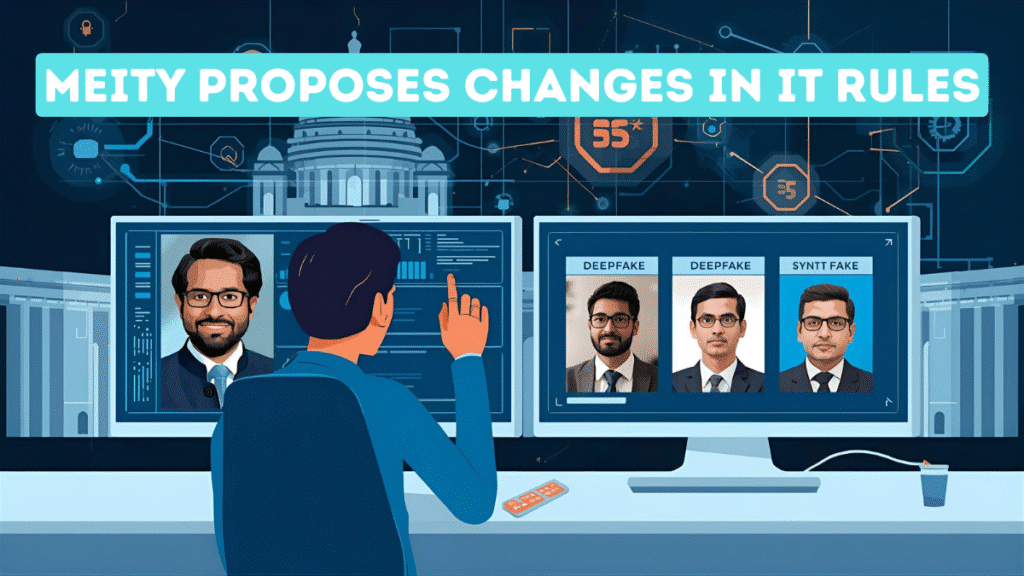Introduction: MEITY Proposes Changes in IT Rules
The Ministry of Electronics and Information Technology (MEITY) has released a draft proposing changes to India’s Information Technology Rules to counter the growing misuse of AI-generated content and deepfakes.
The new draft seeks to make social media platforms accountable for detecting and labeling synthetic media, helping users identify what’s real and what’s not.
Table of Contents
What the Draft Proposes
Under the proposed IT Rules Amendment 2025, large social media platforms — defined as those with more than 50 lakh users — will need to adopt stronger mechanisms to manage synthetic content responsibly.
According to the draft, platforms must:
- Ask users whether their uploaded material has been created or altered using AI.
- Take reasonable steps to verify such declarations.
- Clearly label or mark synthetic content so that audiences can identify it.
As per the proposal, these labels should cover at least 10% of a video’s visible area, or in the case of audio, remain audible for the first 10% of the clip.
Once applied, platforms will not be allowed to remove or alter these markers.
The ministry explained that this requirement will make it easier for people to tell synthetic media apart from genuine content, reducing the risk of fake news, impersonation, and misinformation.
Legal Protection for Platforms
The draft also includes provisions that grant legal protection to platforms acting in good faith when they remove or block harmful or misleading AI-generated content.
This safeguard aims to encourage quick, responsible responses to flagged deepfake or synthetic posts without fear of unnecessary legal trouble.
Officials from MEITY have said that these changes balance innovation with accountability, ensuring that platforms remain responsible while AI development continues to grow in India.
Public Consultation and Next Steps
The ministry has opened the draft for public feedback until November 6, 2025, inviting citizens, experts, and companies to submit their views before the amendments are finalized.
The consultation process reflects MEITY’s focus on transparency and collaboration as India moves toward a comprehensive AI regulation framework.
Impact of the New IT Rules on Users and Platforms
| Category | Expected Impact |
|---|---|
| Users | Clearer understanding of AI-generated content; reduced exposure to misinformation. |
| Social Media Platforms | Requirement to use AI-detection and labeling systems; higher compliance responsibility. |
| Government | Better tools to trace deepfakes and monitor digital misinformation. |
By improving detection and transparency, these rules aim to make digital spaces safer and more trustworthy for everyone.
Why These Changes Matter
Generative AI tools have made it easy to produce highly realistic fake videos, voices, and images — often used for scams, election interference, or non-consensual material.
By proposing these new IT rules, MEITY is taking a proactive step to protect citizens from such threats while maintaining room for technological innovation.
Conclusion
With MEITY proposing changes in IT Rules, India is positioning itself as one of the first major countries to set clear boundaries for AI-generated content and deepfakes.
The draft emphasizes transparency, accountability, and awareness — key pillars for digital safety in the age of artificial intelligence.
If implemented effectively, these amendments could serve as a global example of how to manage synthetic media responsibly while still encouraging AI-driven innovation.

